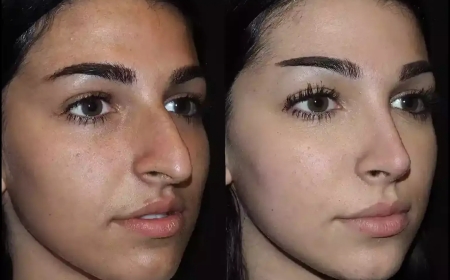How Poor Sleep Triggers Nausea: The Sleep-Digestion Connection
In this article, you will understand why can sleep deprivation cause nausea, what happens in your body, and practical steps you can take to reduce nausea while improving your sleep quality.

Have you noticed feeling sick to your stomach after a night of restless tossing and turning? Many wonder, can sleep deprivation cause nausea, and the clear answer is yes. Poor sleep impacts nearly every system in your body, including digestion, leading to nausea, bloating, and morning queasiness.
Why Sleep Is Essential for Digestion
Sleep is not just for rest; it is crucial for:
-
Regulating hormones that control hunger and stress
-
Supporting the gut-brain connection
-
Managing digestive motility and enzyme function
When you lack sleep, these processes are disrupted, explaining why can sleep deprivation cause nausea is a concern for many individuals.
Can Sleep Deprivation Cause Nausea? The Biological Reasons
1. Hormonal Disruption
Sleep deprivation raises cortisol levels, the stress hormone, which slows digestion, leading to nausea. It also disrupts ghrelin and leptin, hormones that regulate appetite, further confusing your digestive signals.
2. Gut-Brain Axis Imbalance
Your gut and brain are connected through the vagus nerve. Poor sleep increases stress, which overstimulates this pathway, leading to nausea and digestive discomfort.
3. Slowed Digestion
Lack of sleep slows your digestive process, causing food to remain longer in your stomach, increasing discomfort and nausea.
4. Heightened Sensitivity
Sleep deprivation makes your body more sensitive to minor gastrointestinal issues, making them feel more severe and causing nausea.
These combined factors clarify why can sleep deprivation cause nausea is not just a feeling but a real physiological reaction.
Other Digestive Issues Linked to Sleep Deprivation
Besides nausea, poor sleep can cause:
-
Acid reflux and heartburn
-
Bloating and excessive gas
-
Stomach cramps
-
Fluctuations in appetite
-
Aggravation of IBS symptoms
These issues are interconnected with can sleep deprivation cause nausea, often worsening with continued poor sleep habits.
Morning Nausea and Poor Sleep
If you often wake up feeling nauseous, you may question, can sleep deprivation cause nausea in the morning? The answer is yes, due to:
-
Hormonal imbalances disrupting digestion
-
Lying down after late meals leading to acid reflux
-
Increased anxiety from lack of sleep
Morning nausea is a clear sign your body is reacting to insufficient or poor-quality sleep.
Who Is at Higher Risk?
Those most likely to notice can sleep deprivation cause nausea include:
-
Students with irregular sleep patterns
-
Shift workers
-
Individuals with high stress levels
-
People with existing digestive conditions like GERD or IBS
For these groups, even a few nights of poor sleep can trigger noticeable digestive symptoms.
Managing Nausea Caused by Sleep Deprivation
If you experience nausea after a poor nights sleep, consider these steps:
Improve Sleep Hygiene
-
Keep a consistent sleep schedule
-
Limit screens 1 hour before bed
-
Create a calming bedtime routine
-
Keep your bedroom cool and dark
Stay Hydrated
Dehydration worsens nausea. Drink water regularly, especially in the morning.
Eat Light, Easy-to-Digest Foods
Bland foods like bananas, rice, applesauce, and toast can reduce nausea.
Avoid Heavy or Late Meals
Late-night meals increase the risk of reflux and morning nausea.
Manage Stress
Stress reduction techniques like meditation, deep breathing, or light stretching before bed can improve sleep and reduce nausea.
Try Natural Remedies
Ginger tea, peppermint tea, and small sips of warm water can ease nausea naturally.
These steps will help you address can sleep deprivation cause nausea while working toward long-term improvements in your sleep quality.
When to Seek Medical Help
While can sleep deprivation cause nausea is often lifestyle-related, you should consult a healthcare professional if:
-
Nausea persists for several days
-
You experience severe vomiting
-
There is unexplained weight loss
-
You have severe abdominal pain
-
Nausea is accompanied by dizziness or severe headaches
Persistent symptoms may indicate other underlying health issues requiring medical attention.
Long-Term Effects of Sleep Deprivation on Digestive Health
Chronic poor sleep can lead to:
-
Frequent acid reflux
-
Chronic nausea and digestive discomfort
-
Gut inflammation
-
Poor nutrient absorption
Prioritizing sleep can significantly reduce nausea while improving overall health and digestive comfort.
Tips to Improve Sleep Quality and Reduce Nausea
To address can sleep deprivation cause nausea long-term:
-
Maintain a regular sleep schedule
-
Avoid caffeine in the afternoon and evening
-
Limit alcohol, which disrupts sleep quality
-
Exercise regularly but not right before bedtime
-
Create a restful sleep environment
These lifestyle adjustments support digestive health and reduce the likelihood of nausea linked to poor sleep.
Conclusion
Can sleep deprivation cause nausea? Yes, lack of sleep disrupts your hormones, gut-brain communication, and digestion, leading to nausea and other gastrointestinal issues. By prioritizing quality sleep and healthy lifestyle habits, you can reduce nausea and improve your overall well-being.
If you often feel nauseous after poor sleep, consider addressing your sleep hygiene and stress levels. If symptoms persist, consult a healthcare provider to rule out any underlying health concerns.




























